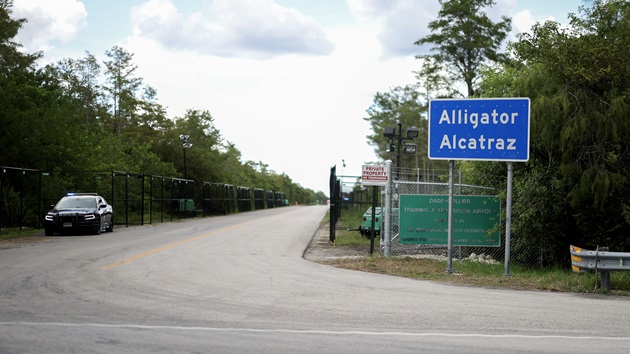
(OCHOPEE, Fla.) — For a month, Rafael Collado couldn’t tell the night from the day.
Detained in the temporary detention center known as “Alligator Alcatraz,” he spent his time confined in a chain-link cage with another man, stuck in what his fiancee Sonia Bichara described as a legal purgatory — unaware of why he was detained, where he might be sent, and how long he would be stuck in the controversial Florida facility.
“They don’t see the daylight. They don’t know what time it is. He’ll call me and say, ‘What time is it? What day is it?'” said Bichara, who said she speaks with Collado daily. “You don’t know if it rains, you don’t know if it’s sunny out there, you don’t know if it’s dark — it’s like you’re dead alive.”
Collado’s experience is far from unique, according to immigration attorneys and advocates who have raised concerns about what they say are inhumane conditions at the migrant detention center. While a federal judge last week blocked further construction at the facility, the state of Florida is still permitted to house thousands of detainees at the site, which is located on a sparsely used airstrip in the Everglades.
“I have never, ever heard of any conditions coming close to those that are presently in existence and Alligator Alcatraz,” said Eric Lee, an attorney who represents a former detainee at the facility. “It’s bordering on torture, based on what I’m hearing from people.”
According to Bichara, Collado told her he spends nearly every moment of his day locked in a chain-link cage inside a large white tent, which frequently floods when it rains. Mosquitoes and other insects swarm around, temperatures fluctuate from sweltering Florida heat to bone-shaking cold from industrial air conditioners, and access to medical attention is limited, according to Bichara.
Neither the Florida Division of Emergency Management nor the Department of Homeland Security responded to a request for comment regarding the allegations.
The facility, which is funded by the federal government and run by the state of Florida, was dubbed “Alligator Alcatraz” by federal officials because it’s surrounded by alligator-infested swampland.
During a visit of the facility last month, President Donald Trump said the center could be a new standard for migrant detention facilities in the U.S.
“I mean, you don’t always have land so beautiful and so secure,” Trump said. “They have a lot of bodyguards and a lot of cops that are in the form of alligators. You don’t have to pay them so much but I wouldn’t want to run through the Everglades for long. It will keep people where they’re supposed to be. This is a very important thing.”
In a legal filing Wednesday, as part of a lawsuit filed last month against the Trump administration over detainees’ access to legal counsel, several attorneys with clients being held at the facility said they haven’t been able to have full access to their clients.
They claim the facility does not allow private calls between attorneys and clients, or have publicly available information about visitation hours, email contacts, and procedures for exchanging legal documents. Attorneys and family members told ABC News detainees are able to make some calls to family members from the detention center.
“These open and non-confidential visitation tents are very much unlike any other facility I have ever seen,” said attorney Vilerka Solange Bilbao, who submitted a declaration Wednesday as part of the lawsuit. “Typically, detention facilities provide enclosed confidential rooms for attorney-client visitation.”
In her declaration, Solange Bilbao said that her client claims that “several people were running fevers and showing COVID symptoms without being separated from the general population; that bathrooms were often out of order or overflowing; that rainwater regularly flooded the tents; and that medical requests were ignored.”
“He and others cannot tell whether it is day or night unless they ask because there is no natural light or clock,” Solange Bilbao said.
“These conditions are not only inhumane — the lack of basic care and communication access directly obstruct my ability to provide effective representation,” she said.
Several attorneys also claimed on Wednesday that people who were moved to “Alligator Alcatraz” were removed from the Immigration and Customs Enforcement detainee locator system, which typically provides online information about detainees’ current location.
“I’ve never seen treatment so deliberately cruel and explicit, more or less explicitly aimed at disincentivizing people from immigrating to the United States based on how they’re treated,” Lee said.
“He says it is worse than prison,” said Bichara of her fiance.
Collado would know, she says. He served a 17-year prison sentence after being convicted of drug charges in the U.S. in the 1990s, and of assaulting a fellow inmate. He’s paid the price for his crimes, Bichara said, and they planned to spend the rest of their lives together in a retirement community in Miami Gardens, Florida.
“He said, ‘I’ve been good for eight years. I don’t even have a speeding ticket. I’ve been paying my debt. You know, I’ve been doing well,'” she said.
Those plans were thrown into uncertainty last month when Collado, who came to the U.S. from Cuba, reported to a federal facility in Miramar, Florida, to complete an annual check-in due to his I-94 status, which gives legal authorization to be in the U.S. to those who entered the country with a temporary visa.
Federal officials detained him during the check-in and sent him to the recently constructed detention facility in the Everglades, according to his fiancee.
Bichara alleges that officials failed to provide Collado with his antidepressant medication during the first two weeks of his detention. He only got his medication, she said, after he unsuccessfully tried to take his own life.
Lee raised similar concerns about the medical conditions at the facility. He said his client Luis Manuel Rivas Velasquez fell sick last week and collapsed, but detention center officials allegedly ignored his pleas for medical attention.
“His cellmates had to drag him down a hallway where guards didn’t even know how to take his pulse to check whether he was still alive,” Lee said.
Both Collado and Rivas Velasquez have since been transferred out of “Alligator Alcatraz” to facilities in Texas, where their families have struggled to contact them, advocates said.
Bichara says she doesn’t know how to help her fiance at this point. Three different lawyers have advised her that challenging Collado’s detention would be costly and unlikely to succeed.
For now, she’s getting legal assistance from a nonprofit, but she worries that she might not see her partner again.
“Emotionally, I don’t know how to explain myself, because I don’t know what to say,” she said. “I don’t know what to think. I don’t know what to do.”
At a press conference on Thursday, Florida Gov. Ron DeSantis said that since the opening of “Alligator Alcatraz,” the state has seen an increase in the number of migrants voluntarily leaving the country. DeSantis said the state will be opening a new immigration detention facility, dubbed “‘Deportation Depot,” that “will have the same services that you have at Alligator Alcatraz.”
“We’ve been securing the border, enforcing immigration laws and removing illegal aliens who are in our society now, sending them back to their home country,” DeSantis said. “We have done more on this than any other state by a country mile.”
Copyright © 2025, ABC Audio. All rights reserved.




